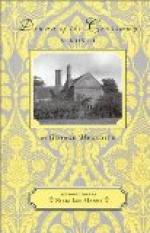At the dinner-table of four, in the evening, conversation would have seemed dull to him, by contrast, had it not, been for the presiding grace of his bride, whose habitually eminent feminine air of superiority to the repast was throned by her appreciative receptiveness of his looks and utterances. Before leaving her, he won her consent to a very early marriage; on the plea of a possibly approaching Session, and also that they had waited long. The consent, notwithstanding the hurry of preparations, it involved, besides the annihilation of her desire to meditate on so solemn a change in her life and savour the congratulations of her friends and have the choir of St. Catherine’s rigorously drilled in her favourite anthems was beautifully yielded to the pressure of circumstances.
There lay on his table at night a letter; a bulky letter. No need to tear it open for sight of the signature: the superscription was redolent of that betraying woman. He tossed it unopened into the fire.
As it was thick, it burned sullenly, discolouring his name on the address, as she had done, and still offering him a last chance of viewing the contents. She fought on the consuming fire to have her exculpation heard.
But was she not a shameless traitor? She had caught him by his love of his country and hope to serve it. She had wound into his heart to bleed him of all he knew and sell the secrets for money. A wonderful sort of eloquence lay there, on those coals, no doubt. He felt a slight movement of curiosity to glance at two or three random sentences: very slight. And why read them now? They were valueless to him, mere outcries. He judged her by the brute facts. She and her slowly-consuming letter were of a common blackness. Moreover, to read them when he was plighted to another woman would be senseless. In the discovery of her baseness, she had made a poor figure. Doubtless during the afternoon she had trimmed her intuitive Belial art of making ‘the worse appear the better cause’: queer to peruse, and instructive in an unprofitable department of knowledge-the tricks of the sex.
He said to himself, with little intuition of the popular taste: She wouldn’t be a bad heroine of Romance! He said it derisively of the Romantic. But the right worshipful heroine of Romance was the front-face female picture he had won for his walls. Poor Diana was the flecked heroine of Reality: not always the same; not impeccable; not an ignorant-innocent, nor a guileless: good under good leading; devoted to the death in a grave crisis; often wrestling with her terrestrial nature nobly; and a growing soul; but not one whose purity was carved in marble for the assurance to an Englishman that his possession of the changeless thing defies time and his fellows, is the pillar of his home and universally enviable. Your fair one of Romance cannot suffer a mishap without a plotting villain, perchance many of them; to wreak




